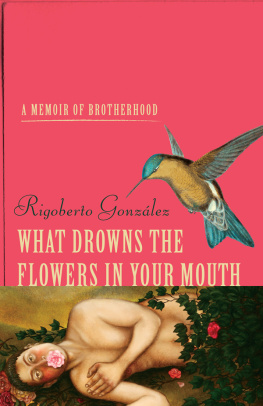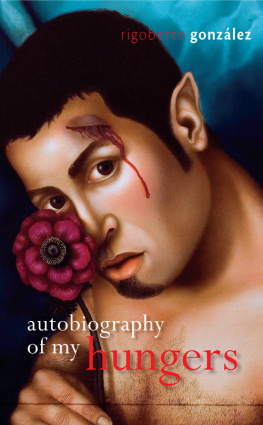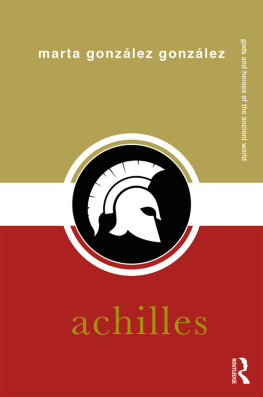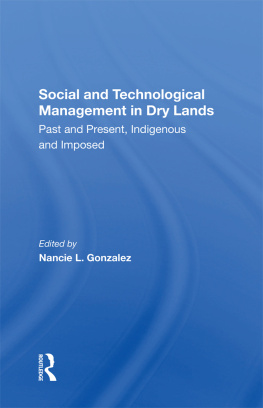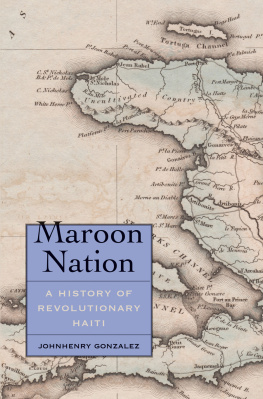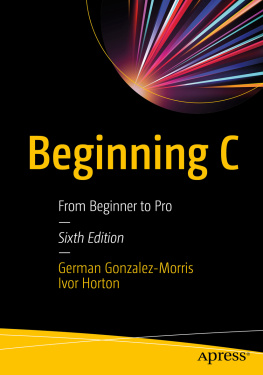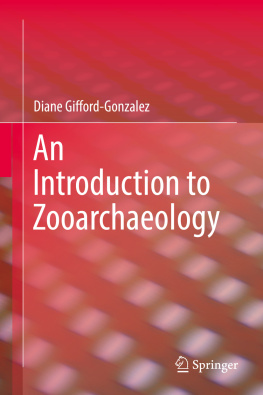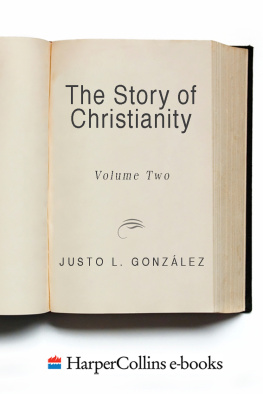Rigoberto Gonzalez - Pivotal Voices, Era of Transition
Here you can read online Rigoberto Gonzalez - Pivotal Voices, Era of Transition full text of the book (entire story) in english for free. Download pdf and epub, get meaning, cover and reviews about this ebook. year: 2017, publisher: University of Michigan Press, genre: Art. Description of the work, (preface) as well as reviews are available. Best literature library LitArk.com created for fans of good reading and offers a wide selection of genres:
Romance novel
Science fiction
Adventure
Detective
Science
History
Home and family
Prose
Art
Politics
Computer
Non-fiction
Religion
Business
Children
Humor
Choose a favorite category and find really read worthwhile books. Enjoy immersion in the world of imagination, feel the emotions of the characters or learn something new for yourself, make an fascinating discovery.

- Book:Pivotal Voices, Era of Transition
- Author:
- Publisher:University of Michigan Press
- Genre:
- Year:2017
- Rating:5 / 5
- Favourites:Add to favourites
- Your mark:
- 100
- 1
- 2
- 3
- 4
- 5
Pivotal Voices, Era of Transition: summary, description and annotation
We offer to read an annotation, description, summary or preface (depends on what the author of the book "Pivotal Voices, Era of Transition" wrote himself). If you haven't found the necessary information about the book — write in the comments, we will try to find it.
Pivotal Voices, Era of Transition — read online for free the complete book (whole text) full work
Below is the text of the book, divided by pages. System saving the place of the last page read, allows you to conveniently read the book "Pivotal Voices, Era of Transition" online for free, without having to search again every time where you left off. Put a bookmark, and you can go to the page where you finished reading at any time.
Font size:
Interval:
Bookmark:
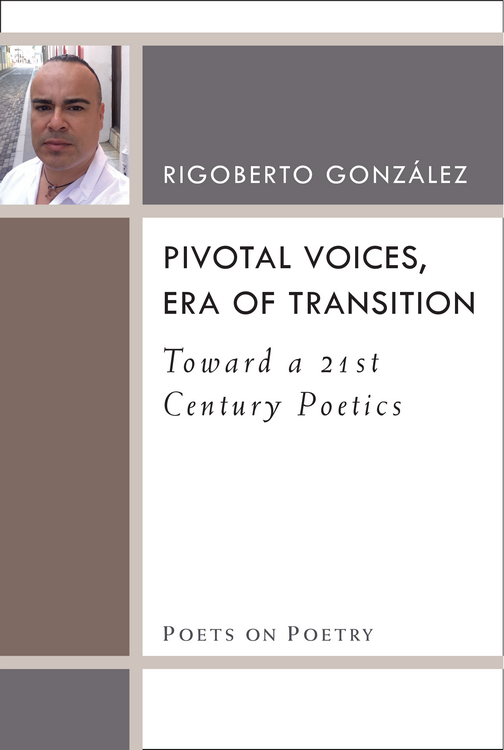
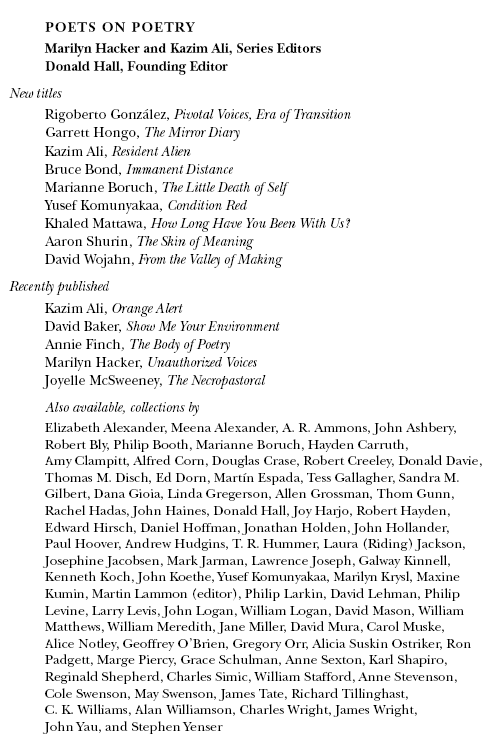
Rigoberto Gonzlez
University of Michigan Press
Ann Arbor
Copyright 2017 by Rigoberto Gonzlez
All rights reserved
This book may not be reproduced, in whole or in part, including illustrations, in any form (beyond that copying permitted by Sections 107 and 108 of the U.S. Copyright Law and except by reviewers for the public press), without written permission from the publisher.
Published in the United States of America by the
University of Michigan Press
Manufactured in the United States of America
A CIP catalog record for this book is available from the British Library.
Library of Congress Cataloging-in-Publication data has been applied for.
ISBN 978-0-472-03697-4 (paper : alk. paper)
ISBN 978-0-472-12319-3 (e-book)
Rest In Power
ralrsalinas
Jos Montoya
Judith Ortiz Cofer
Wanda Coleman
Francisco X. Alarcn
Latino Poetry: Pivotal Voices, Era of Transition is a lecture delivered at the Library of Congress on April 10, 2014, on the occasion of National Poetry Month, sponsored by Letras Latinas, the literary initiative at the Institute for Latino Studies at the University of Notre Dame. With thanks to Francisco Aragn. Alurista: Toward a Chicano Poetics includes the preface written for Aluristas volume of poetry, which I also edited, Xicano Duende: A Select Anthology (Tempe, AZ: Bilingual Press, 2011). With thanks to Gary Keller. A compressed version of The Double Doors into J. Michael Martinezs Heredities appears in Angels of the Americlypse: An Anthology of New Latin@ Writing, edited by Carmen Gimnez Smith and John Chvez (Denver: Counterpath Press, 2014). The Blatino Poetics of Aracelis Girmay is a lecture delivered at the Vermont College of Fine Arts on December 31, 2014. Publishers on a Mission: Three Excellent Debut Poets, Powerful Debuts by Three African-American Poets, Midcareer: Three Poets and Their Four Books, and Juan Felipe Herreras Global Voice and Vision appeared in the Los Angeles Review of Books as commissioned reviews published on May 13, 2013, January 18, 2014, July 21, 2015, and September 23, 2015, respectively. With thanks to Tom Lutz. The reviews of Iliana Rochas Karankawa and Shane McCraes The Animal Too Big to Kill appeared in The Rumpus, published on October 21, 2015, and January 13, 2016, respectively. With thanks to Brian Spears. The reviews in the Twelve Essential Latino Poetry Books section were part of my column with the El Paso Times of Texas, which ran from 2002 to 2012. With thanks to the now-retired features editor Ramn Rentera. The Activist Role of the Writer is adapted from a keynote address delivered at the University of CaliforniaDavis on May 15, 2014, on the occasion of the 2014 Conference TransAmericas, sponsored by the UC Davis Queer, Feminist and Transgender Studies Research Cluster. An excerpt was reprinted in The Rumpus as part of a roundtable forum titled Fate of the Writer: Shuttling between Solitude and Engagement. With thanks to David Biespiel. The Writers Journey: A Motivation is a commencement speech delivered at Pine Manor College on July 19, 2014, on the occasion of the Solstice Low-Residency MFA Program summer graduation. With thanks to Meg Kearney. Poetry Brings out the Mexican in Me appears in Others Will Enter the Gates: Immigrant Poets on Poetry, Influences, and Writing in America, edited by Abayomi Animashaun (Hudson, NY: Black Lawrence Press, 2015). The Bill Whitehead Award for Lifetime Achievement Speech was delivered on April 23, 2015, on the occasion of the 2015 Publishing Triangle Awards. The opening section of Erotic Light, Amor Oscuro: On the Queer Poetics of Francisco X. Alarcn and His Muse, Federico Garca Lorca was published as a tribute to Alarcn with NBC-Latino online on January 17, 2016; the remaining essay was delivered as a lecture at the X Congreso Internacional Sobre Literatura Chicana y Estudios Latinos in Madrid, Spain, on May 30, 2016. Thanks again to Francisco Aragn, Alarcns translator, for insights on De amor oscuro/Of Dark Love. Many thanks to Ocean Vuong and Rajiv Mohabir for trusting me with their manuscripts. And many thanks to Kazim Ali for being persistent and patient as I gathered the acorns to complete this book.
I have always contended that the most important work being done today is in the field of ethnic letters. Id like to add that within that field, the most critical pressure point pulses from the queer body of colorits representation and its cultural production. And this speaks to the necessity of scholarly conversations like the ones I am initiating in these essays, which give context, language, and energy to the study and appreciation of the difficult but beautiful journeys of some of the most exciting writers of today. Note that although I identify as a queer Chicano writer and critic, I am not limiting my focus to works by queer Chicanos. I have purposely reached out to include studies on writings by African American, Asian American, and Native American writers. This is both an act of solidarity and a gesture toward accuracy and honesty since, particularly in the poetry community, these ethnic groups intersect socially and politically.
Another important choice Ive made is in engaging the works of a few veteran writers, like Alurista and Robert Haydenliterary ancestors to many of the younger voices Im writing about. (I include a longer piece on Juan Felipe Herrera in the Critical Reviews section and one on Francisco X. Alarcn in the Critical Grace Notes section.) As I point out in my Library of Congress lecture, Latino Poetry: Pivotal Voices, Era of Transition, its important to look back in order to gain perspective about where we are headed next. But my attention is mostly on the younger voices themselves, visions that I believe will amplify the visibility of the communities they belong to.
I place my hope on the next generation of writers of color because hope is inextricably bound to our stories, which is why we must continue telling them. Our stories are sometimes sad, sometimes tragic, sometimes painful to listen to, but they are evidence of our fortitude and perseverance. Our writers matter because they tell us that our narratives are important enough to be recorded on paper for posterity. And there is something absolutely marvelous in the knowledge that people like ourselves made the glorious decision to imagine our bodies, our bodies of color, our queer bodies of color, as empowered participants and protagonistsaway from the edges of alienation and exile and closer to the truths of our unerasable realities.
The recent deaths of some of our legendary Latino citizen-writers gives fresh perspective to the remarks Im about to make because it reaffirms the need to continue our communitys artistic production and to contribute to the literary legacy of those who, long before many of us even knew how to read, placed expression on the page in order to inspire, motivate, and educate the audience of their time and the audience yet to come. The loss of those writers who precede us underscores the urgency of new responsibilities: we must remember their names and achievements so that we may have a history; we must move forward as mentors and teachers so that we may hold sacred their values; we must weave our struggles with theirs so that we may have a journey with a past, a present, and a future. And let us reflect on our own mortality, that as time passes we are all one step closer to our own demise. Have we done right by the lessons of those who came before? Have we done our part to clear a path for those who come after? This is the light under which I present the following insights about the contemporary period of Latino poetry and its most exceptional voices who will guide us through the shifting demographics of this countrys population, for I am convinced that Latino letters, so often ignored or overlooked by the current literary establishment, will become the most important cultural testaments bearing witness to the era of transition. The work being published today will address the critical questions of tomorrows sizable Latino population: Who were we back then? How did we get here? Where do we go next?
Next pageFont size:
Interval:
Bookmark:
Similar books «Pivotal Voices, Era of Transition»
Look at similar books to Pivotal Voices, Era of Transition. We have selected literature similar in name and meaning in the hope of providing readers with more options to find new, interesting, not yet read works.
Discussion, reviews of the book Pivotal Voices, Era of Transition and just readers' own opinions. Leave your comments, write what you think about the work, its meaning or the main characters. Specify what exactly you liked and what you didn't like, and why you think so.

